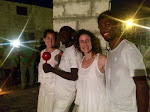Souvenance means remembering. The ceremony commenced with a procession to the Mapou, and then circled it -- symbolizing the journey across the Atlantic that African slaves made coming to Haiti. It can also have a dual meaning referencing the crossing of water in Vodou cosmology. Kiran, one of my travel partners at Souvenance, told me this in a personal communication.
At first the music was only voices and then the conch call joined the drumming. The ounsi and any other people invited to participate gathered and sat on the large roots of the Mapou awaiting their ritual piece of meat -- almost like a Catholic communion -- distributed by the sevité. I was told that this was the bull that had been sacrificed the previous day. There were ritual actions occurring at the base of the Mapou that I could not see. The energy in general was peaceful and calm.
Observers and guests in the lakou began to gather in the larger yard area to take in the rhythms and songs from a comfortable position in the shade. Most of the vendors in the market moved to the yard as well and everyone seemed to spend the day at the Mapou tree whether they were paying close attention to the ceremony, participating, or just enjoying the company of many and the beauty of the day.
The ceremony moved to the side of the tree and there was quite some time devoted to individual salutations. Three leaders -- the sevité, eldest larenn, and possibly the sevité's brother -- stood and greeted the ounsi as they engaged in a typical Vodou salutation of either holding both hands and turning around, shaking hands firmly with an accent down, or hugging. Sometimes when the ounsi are turned by the sevité they are overcome momentarily by a spirit.
Again, a cycle of songs and rhythms continued with the ounsi dancing back and forth between the tree and the drummers. A couple of ounsi fell to the ground and their muscles contracted so that their legs were tight together, crossed at the ankles and feet, body stiff, and arms tight in towards the body. It was explained to me that this is called "sep." Sep is when someone has broken a rule of Vodou and the lwa are punishing them. The sevité must say a prayer over the person in order to break the affliction. At that moment the person is able to get up and continue with the ceremony or whatever they were doing. However, it is a great moment of shame for the person and their family. When I told a Haitian friend of mine in NY about it afterwards she mentioned how it had happened to her when she was visiting either Soukri or Souvnans. She had had sex in the lakou and then got the sep because of it. Sex is not allowed in the lakou during the ceremonies.
The younger larenn sang tirelessly into the afternoon. At one point a key was presented to the elder larenn by an ounsi. Late in the afternoon an ounsi appeared in her colored ceremonial garb. This was quite a contrast to the day's ceremonial clothing of crisp whites. Her presence also signaled the transition for all the ounsi to change into their colored ceremonial clothing. Once everyone had changed there would be a procession back to the peristil.
Observers and guests in the lakou began to gather in the larger yard area to take in the rhythms and songs from a comfortable position in the shade. Most of the vendors in the market moved to the yard as well and everyone seemed to spend the day at the Mapou tree whether they were paying close attention to the ceremony, participating, or just enjoying the company of many and the beauty of the day.
The ceremony moved to the side of the tree and there was quite some time devoted to individual salutations. Three leaders -- the sevité, eldest larenn, and possibly the sevité's brother -- stood and greeted the ounsi as they engaged in a typical Vodou salutation of either holding both hands and turning around, shaking hands firmly with an accent down, or hugging. Sometimes when the ounsi are turned by the sevité they are overcome momentarily by a spirit.
Again, a cycle of songs and rhythms continued with the ounsi dancing back and forth between the tree and the drummers. A couple of ounsi fell to the ground and their muscles contracted so that their legs were tight together, crossed at the ankles and feet, body stiff, and arms tight in towards the body. It was explained to me that this is called "sep." Sep is when someone has broken a rule of Vodou and the lwa are punishing them. The sevité must say a prayer over the person in order to break the affliction. At that moment the person is able to get up and continue with the ceremony or whatever they were doing. However, it is a great moment of shame for the person and their family. When I told a Haitian friend of mine in NY about it afterwards she mentioned how it had happened to her when she was visiting either Soukri or Souvnans. She had had sex in the lakou and then got the sep because of it. Sex is not allowed in the lakou during the ceremonies.
The younger larenn sang tirelessly into the afternoon. At one point a key was presented to the elder larenn by an ounsi. Late in the afternoon an ounsi appeared in her colored ceremonial garb. This was quite a contrast to the day's ceremonial clothing of crisp whites. Her presence also signaled the transition for all the ounsi to change into their colored ceremonial clothing. Once everyone had changed there would be a procession back to the peristil.

No comments:
Post a Comment